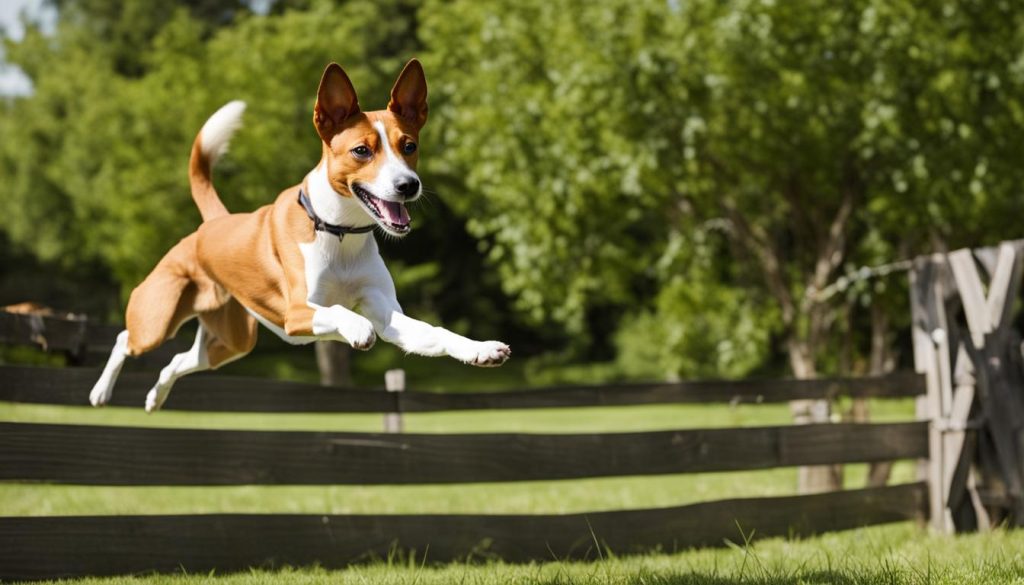Training a Basenji can be quite a challenge, but with the right approach and techniques, you can achieve success in obedience and enjoy a happy and well-behaved pup. Many first-time Basenji owners make common mistakes that inadvertently encourage destructive behavior. It is crucial to understand the proper tools and methods for effective training. Traditional training methods may not work well with Basenjis, so it is important to learn modern and updated training principles.
Basenji training requires a unique understanding of their temperament and behavior. These affectionate, intelligent, and energetic dogs are eager to please their owners but can also be manipulative if not properly trained. Basenjis are curious and alert, always looking for adventure. However, if they do not receive enough mental and physical stimulation, they can become destructive and develop behavior problems. To achieve effective Basenji training, it is important to work with their natural instincts and adapt your training methods accordingly.
Effective Basenji Training
- Basenji training requires an understanding of their unique temperament and behavior.
- Traditional training methods may not be as effective with Basenjis, so it is essential to learn modern and updated techniques.
- Provide plenty of mental and physical stimulation to prevent boredom and destructive behavior.
- Work with their natural instincts and adapt your training methods accordingly.
- Consistency and patience are key in training a Basenji.
Understanding the Basenji Temperament
The Basenji temperament is as unique as the breed itself. These affectionate, intelligent, and energetic dogs have a personality that requires specific handling and training methods. Basenjis are known for their eagerness to please their owners, but they can also be manipulative if not properly trained.
Basenjis are inherently curious and alert, always on the lookout for adventure. They possess a keen sense of curiosity and a strong desire to explore their surroundings. However, without sufficient mental and physical stimulation, Basenjis can become destructive and develop behavior problems.
Understanding the Basenji’s natural instincts is crucial when it comes to training. By working with their unique temperament, you can achieve effective training results. It is important to provide them with outlets for their energy, such as daily exercise and interactive toys, to prevent boredom and encourage positive behavior.
Whether it’s their intelligence, energy, or affectionate nature, the Basenji temperament requires the right balance of guidance and structure. By using positive reinforcement techniques and establishing clear boundaries, you can foster a harmonious relationship with your Basenji and help them thrive in various environments.
Tips for Successful Basenji Training
Training a Basenji can be a rewarding experience when approached with the right techniques and mindset. This section provides valuable tips to help you succeed in training your Basenji companion.
Start Early:
Basenjis are known for their intelligence and ability to learn at a young age. Begin training your Basenji as early as possible, starting with basic commands like sit, stay, and come. Consistency and repetition are key to reinforcing these behaviors.
Crate Training:
Crate training is highly recommended for Basenjis as it provides them with a safe space of their own and helps establish a routine. Introduce the crate gradually, using positive reinforcement to create a positive association. Ensure the crate is comfortable and filled with toys to keep your Basenji entertained.
Establish Boundaries:
Basenjis thrive in an environment with clear rules and boundaries. Treat your Basenji more like a tamed wild animal than a domestic dog and establish yourself as the pack leader. This will help your Basenji understand their place in the pecking order and promote obedience.
Provide Mental and Physical Stimulation:
Basenjis are an active and intelligent breed that requires ample mental and physical stimulation to prevent boredom and destructive behavior. Engage in daily exercise routines, interactive play sessions, and provide puzzle toys to keep their minds sharp and bodies tired.
Consistency is Key:
Consistency is vital in Basenji training. Establish clear rules and expectations for behavior and stick to them. Use positive reinforcement techniques such as treats, praise, and playtime to reward desirable behaviors consistently. Avoid punishment or harsh training methods, as this can hinder their progress.
Leash Training:
Leash training is essential for Basenjis to ensure their safety and prevent them from chasing after small animals. Start by introducing your Basenji to a leash in a positive and controlled environment. Use treats and positive reinforcement to encourage them to walk calmly on the leash.
Recall Training:
Basenjis have a strong prey drive, which can lead them to chase after small animals if not properly trained. Teach your Basenji a reliable recall command, such as “come,” using positive reinforcement and high-value rewards. Practice recall training in a secure and controlled environment before moving to more challenging situations.
Remember, every Basenji is unique, and training methods may need to be tailored to their individual personality and learning style. Patience, consistency, and positive reinforcement are key to successful Basenji training. By implementing these tips, you’ll be well on your way to having a well-behaved and happy Basenji companion.
Basenji Training Techniques
When it comes to training Basenjis, positive reinforcement techniques work best. These include using rewards such as treats, praise, and playtime to reinforce desired behaviors. Professional Basenji trainers often utilize these techniques with great success. It is important to avoid punishment or forceful training methods, as Basenjis respond better to positive reinforcement and understanding.
Training Basenjis requires patience and consistency. It may take some time for them to fully understand and comply with commands, but with the right approach, you can achieve success. By using positive reinforcement, you can create a positive association between desired behaviors and rewards, making the training experience enjoyable for your Basenji.
One effective technique is clicker training, where a clicking sound is used to mark the desired behavior followed by a reward. This technique helps to establish a clear communication channel between you and your Basenji, making it easier for them to understand what you expect from them.
Another important aspect of Basenji training is understanding their unique needs and temperament. Basenjis are intelligent and independent dogs, so it’s crucial to keep training sessions engaging and interesting. Incorporating mental stimulation activities, such as puzzle toys or scent games, can help keep them mentally engaged and prevent boredom.
Consistency is key in Basenji training. Establish clear rules and boundaries from the beginning, and be consistent in your expectations. Use the same commands and gestures consistently to avoid confusion. Basenjis thrive on routine, so creating a training schedule and sticking to it will help them understand what is expected of them.
- Use positive reinforcement techniques, such as treats, praise, and playtime, to reinforce desired behaviors.
- Avoid punishment or forceful training methods, as Basenjis respond better to positive reinforcement.
- Be patient and consistent in your training approach, as it may take time for Basenjis to understand and comply with commands.
- Consider clicker training and incorporate mental stimulation activities to keep Basenjis engaged.
- Establish clear rules and boundaries, and be consistent in your expectations.
Common Behavioral Issues and Troubleshooting
Basenjis are intelligent and spirited dogs, but they can sometimes exhibit behavioral problems if not properly trained and socialized. Understanding and addressing these issues is crucial for creating a well-behaved and happy Basenji companion. In this section, I will discuss some common behavioral problems that Basenjis may face and provide troubleshooting tips to overcome them.
Obsessive Digging
One common behavioral issue in Basenjis is obsessive digging. If your Basenji is constantly digging up your yard or garden, it’s important to redirect this behavior. Provide designated digging areas or a sandbox where your Basenji can satisfy their natural digging instincts. Encourage and reward them when they use these designated areas, and discourage digging in other areas by redirecting their attention to toys or engaging activities.
Separation Anxiety
Basenjis can be prone to separation anxiety, which can result in destructive behavior when left alone. To address separation anxiety, gradually increase the time your Basenji spends alone, starting with short intervals and gradually extending them. Create a safe and comfortable space for your Basenji while you’re away, such as a crate or a designated area with their favorite toys and a cozy bed. Additionally, provide mental stimulation before leaving by engaging in interactive play or puzzle toys to help keep them occupied.
Destructive Behavior
Destructive behavior, such as chewing furniture or household items, can be frustrating. To deter this behavior, ensure that your Basenji has plenty of appropriate toys and chew items available. Teach them what is acceptable to chew on by redirecting their attention to toys when you catch them chewing furniture or other inappropriate items. Additionally, make sure your Basenji gets enough exercise and mental stimulation to prevent boredom, which can contribute to destructive behavior.
Running Away
Basenjis have a strong prey drive and can be prone to running away if they catch a scent or spot something interesting. To prevent your Basenji from running away, ensure that your yard is secure with a high fence. Supervise your Basenji when outside and consider using a long leash or a training lead to provide control while allowing them some freedom. Consistently reinforce the “come” command and practice recall in a controlled environment to ensure that your Basenji responds when called.
Food Stealing
Basenjis have a mischievous side and may indulge in food stealing if given the chance. To prevent food stealing, establish clear boundaries and rules around food. Keep food out of your Basenji’s reach and never leave unattended plates or countertops with food. Teach your Basenji basic obedience commands like “leave it” and “drop it” to reinforce good behaviors and discourage food stealing.
Remember, consistency and patience are key when addressing behavioral issues in Basenjis. If you’re facing persistent challenges, consider seeking professional help from a certified dog trainer or behaviorist who has experience with Basenjis. Attending Basenji training classes can also provide valuable guidance and support in tackling these issues effectively.

The Importance of Basenji Socialization
Socialization is crucial for Basenjis to develop proper behavior and interact well with other dogs and people. Early socialization should begin in the puppy stage and continue throughout their lives. Introducing your Basenji to various environments, people, and other dogs helps them become familiar with different situations.
Proper socialization can help prevent fear-based aggression, anxiety, and other behavioral problems that may arise in Basenjis. Gradual exposure, positive reinforcement, and controlled interactions are essential in ensuring successful Basenji socialization.
- Start socializing your Basenji at a young age to help them become comfortable with new experiences.
- Expose them to different environments, such as parks, streets, and indoor settings, to help them adapt to various situations.
- Introduce your Basenji to different people, including children, adults, and strangers, to build their confidence and trust.
- Arrange controlled interactions with friendly and well-behaved dogs to teach your Basenji appropriate social skills.
- Provide positive reinforcement, like treats and praise, to reward desired behaviors during socialization sessions.
By focusing on Basenji socialization, you can help your pup develop into a well-behaved and confident companion. Remember, every Basenji is unique, so tailor the socialization process to their individual needs and personality.
Health and Grooming Considerations for Basenjis
Basenjis are generally healthy dogs, but it’s important to be aware of certain health conditions that they may be prone to. Regular check-ups with a veterinarian are essential for monitoring their health and addressing any issues promptly.
Some common health conditions that Basenjis may face include:
- Progressive retinal atrophy
- Fanconi syndrome
- Basenji enteropathy
These conditions can be managed with proper care and treatment. Regular veterinary care will help ensure that any potential issues are caught early and appropriate steps are taken to maintain your Basenji’s well-being.

Grooming Basenjis is relatively easy as they have a low tendency to shed. Regular brushing helps remove loose hair and keeps their coat clean and healthy. Occasional baths can be given when necessary to keep them smelling fresh.
Additionally, paying attention to their nutrition and exercise is crucial in keeping your Basenji happy and healthy. Providing a balanced diet and engaging them in regular physical activities will contribute to their overall well-being and vitality.
Conclusion
Training a Basenji can be a rewarding experience, but it requires patience, consistency, and a deep understanding of their unique temperament. By following the right training techniques and providing proper socialization and mental stimulation, you can successfully train your Basenji and develop a strong bond with them.
It is crucial to tailor your training approach to your Basenji’s individual personality and always rely on positive reinforcement. Basenjis respond well to rewards, such as treats, praise, and playtime, to reinforce desired behaviors. Punishment or forceful training methods should be avoided, as they can hinder the training process.
Remember that Basenjis thrive on mental and physical stimulation, so provide them with plenty of activities and exercises to prevent boredom and destructive behavior. Establish clear rules and boundaries, and be consistent in your expectations. With the right Basenji training methods and a commitment to their well-being, you can have a well-behaved and happy Basenji companion.
FAQ
What are some common behavioral issues that Basenjis may exhibit?
Basenjis can develop problems such as obsessive digging, separation anxiety, destructive behavior, running away, and food stealing if not properly trained and socialized.
How can I address behavioral problems in my Basenji?
It is important to address behavioral issues early on by modifying the training approach, seeking professional help, or attending Basenji training classes. Consistency and patience are key in overcoming these problems.
Why is socialization important for Basenjis?
Socialization is crucial for Basenjis to develop proper behavior and interact well with other dogs and people. Early socialization should begin in the puppy stage and continue throughout their lives.
What are some health considerations for Basenjis?
Basenjis may be prone to health conditions such as progressive retinal atrophy, Fanconi syndrome, and Basenji enteropathy. Regular check-ups with a veterinarian are important to monitor their health and address any issues promptly.






